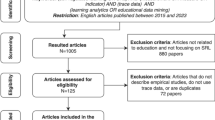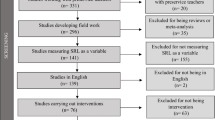Abstract
Self-regulated learning (SRL) has been demonstrated in numerous scientific studies as an effective alternative to traditional teaching methods, fostering individual learning processes. The added value of educational technology in supporting SRL has also been widely researched and largely validated. Within this context, the teacher plays a pivotal role. However, much of the existing research has been conducted at universities, while the secondary education level has received comparatively less attention. To gain an overview of the teacher’s influence on students’ SRL processes, a PRISMA based systematic literature review was conducted. From an initial pool of 553 documents, 27 relevant studies were identified and analyzed. The selected studies were examined to collect data addressing the research questions, focusing on identifying effective teaching methods and essential teacher competencies for fostering SRL in technology-enhanced classrooms. Furthermore, the analysis highlights the evolving role of teachers and underscores the need for additional training to support these changes.
Access this chapter
Tax calculation will be finalised at checkout
Purchases are for personal use only
Similar content being viewed by others
References
Adıgüzel, T., Aşık, G., Bulut, M., Kaya, M., Özel, S.: Teaching self-regulation through role modeling in K-12. Front. Educ. 8 (2023). https://doi.org/10.3389/feduc.2023.1105466
Ateş, H.: Designing a self-regulated flipped learning approach to promote students’ science learning performance. Educ. Technol. Soc. 27(1), 65–83 (2024). https://doi.org/10.30191/ETS.202401_27(1).RP05
Brünner, B., Burgsteiner, H., Schön, S., Ebner, M.: The synergy of educational technologies and self-regulated learning: a systematic scoping literature review. In: Auer, M.E., Rüütmann, T. (eds.) Futureproofing Engineering Education for Global Responsibility, pp. 301–315. Springer, Cham (2025). https://doi.org/10.1007/978-3-031-85649-5_30
Chang, C.C., Liang, C., Chou, P.N., Liao, Y.M.: Using e-portfolio for learning goal setting to facilitate self-regulated learning of high school students. Behav. Inf. Technol. 37(12), 1237–1251 (2018). https://doi.org/10.1080/0144929X.2018.1496275
Chang, D., Lin, M.C., Hajian, S., Wang, Q.: Educational design principles of using AI chatbot that supports self-regulated learning in education: goal setting, feedback, and personalization. Sustainability 15(17) (2023). https://doi.org/10.3390/su151712921
Chen, Y.H., Jang, S.J.: Exploring the relationship between self-regulation and TPACK of taiwanese secondary in-service teachers. J. Educ. Comput. Res. 57(4), 978–1002 (2019). eRIC Number: EJ1217703
Chiu, T.: A classification tool to foster self-regulated learning with generative artificial intelligence by applying self-determination theory: a case of ChatGPT. Educ. Technol. Res. Dev. (2024). https://doi.org/10.1007/s11423-024-10366-w
Chiu, T., Moorhouse, B., Chai, C., Ismailov, M.: Teacher support and student motivation to learn with Artificial Intelligence (AI) based chatbot. Interact. Learn. Environ. (2023). https://doi.org/10.1080/10494820.2023.2172044
Denyer, D., Tranfield, D., van Aken, J.: Developing design propositions through research synthesis. Organ. Stud. 29, 393–413 (2008). https://doi.org/10.1177/0170840607088020
Ebner, M., Taraghi, B., Nagler, W., Kamrat, I.: Teaching and Learning in Higher Education - An Integral Approach (2010)
Hattie, J.: Teachers Make a Difference, What is the research evidence? Australian Council for Educational Research (2003)
Heikkilä, A.S., Vuopala, E., Leinonen, T.: Design-driven education in primary and secondary school contexts. A qualitative study on teachers’ conceptions on designing. Technol. Pedagogy Educ. 26(4), 471–483 (2017). https://doi.org/10.1080/1475939X.2017.1322529
Hidajat, F., Haeruman, L., Wiraningsih, E., Pambudi, D.: The effect of digital technology learning based on guided discovery and self-regulated learning strategy on mathematical creativity. Int. J. Inf. Educ. Technol. 13(3), 535–543 (2023). https://doi.org/10.18178/ijiet.2023.13.3.1836
Huang, L., Li, S., Poitras, E., Lajoie, S.: Latent profiles of self-regulated learning and their impacts on teachers’ technology integration. Br. J. Educ. Technol. 52(2), 695–713 (2021). https://doi.org/10.1111/bjet.13050
Huang, X., Huang, L., Lajoie, S.: Exploring teachers’ emotional experience in a TPACK development task. Educ. Technol. Res. Dev. 70(4), 1283–1303 (2022). https://doi.org/10.1007/s11423-022-10135-7
Inprasitha, M.: Blended learning classroom model: a new extended teaching approach for new normal. Int. J. Lesson Learn. Stud. 12(4), 288–300 (2023). https://doi.org/10.1108/IJLLS-01-2023-0011
Jahic, I., Ebner, M., Schön, S.: Harnessing the power of artificial intelligence and ChatGPT in education - a first rapid literature review (2023)
Khalil, M., Ebner, M., Admiraal, W.: How can Gamification Improve MOOC Student Engagement? (2017)
Koehler, M., Mishra, P.: What is technological pedagogical content knowledge (TPACK)? Contemp. Issues Technol. Teach. Educ. 9(1), 60–70 (2009)
Kramarski, B., Heaysman, O.: Promoting teachers’ SRL with professional vision experiences of live-actors simulations and video technology. New Dir. Teach. Learn. 2023(174), 57–64 (2023). https://doi.org/10.1002/tl.20549
Kramarski, B., Heaysman, O.: A conceptual framework and a professional development model for supporting teachers’ “triple SRL-SRT processes” and promoting students’ academic outcomes. Educ. Psychol. 56(4), 298–311 (2021). https://doi.org/10.1080/00461520.2021.1985502
Leitner, P., Khalil, M., Ebner, M.: Learning analytics in higher education—a literature review. In: Peña-Ayala, A. (ed.) Learning Analytics: Fundaments, Applications, and Trends. SSDC, vol. 94, pp. 1–23. Springer, Cham (2017). https://doi.org/10.1007/978-3-319-52977-6_1
Linde, I., Sarva, E., Daniela, L.: The impact of an online professional development course on teachers’ comprehension and self-efficacy in developing students’ self-regulated learning skills. Sustainability 15(12) (2023). https://doi.org/10.3390/su15129408
Majitol, D., Yunus, M.: Teacher’s perception on student’s self-regulated learning in a technology-based learning setting. Int. J. Eval. Res. Educ. 12(3), 1155–1164 (2023). https://doi.org/10.11591/ijere.v12i3.25123
Mayring, P., Fenzl, T.: Qualitative Inhaltsanalyse. In: Baur, N., Blasius, J. (eds.) Handbuch Methoden der empirischen Sozialforschung, pp. 543–556. Springer Fachmedien Wiesbaden, Wiesbaden (2014)
Molenaar, I.: Towards hybrid human-AI learning technologies. Eur. J. Educ. 57(4), 632–645 (2022). https://doi.org/10.1111/ejed.12527
Ng, D., Tan, C., Leung, J.: Empowering student self-regulated learning and science education through ChatGPT: a pioneering pilot study. Br. J. Educ. Technol. (2024). https://doi.org/10.1111/bjet.13454
Page, M.J., et al.: The PRISMA 2020 statement: an updated guideline for reporting systematic reviews. BMJ 372 (2021). https://doi.org/10.1136/bmj.n71
Panadero, E.: A review of self-regulated learning: six models and four directions for research. Front. Psychol. 8 (2017). https://doi.org/10.3389/fpsyg.2017.00422
Pintrich, P.: The Role of Goal Orientation in Self-Regulated Learning. Handbook of Self-regulation (2000). https://doi.org/10.1016/B978-012109890-2/50043-3
Rasheed, R., Kamsin, A., Abdullah, N.: Challenges in the online component of blended learning: a systematic review. Comput. Educ. 144 (2020). https://doi.org/10.1016/j.compedu.2019.103701
Sugrah, N., Suyanta, Wiyarsi, A.: An exploration of FCMs impact on students perceptions of support, self-regulated learning, and critical thinking. Int. J. Inf. Educ. Technol. 13(3), 496–504 (2023). https://doi.org/10.18178/ijiet.2023.13.3.1831
Taranto, D., Buchanan, M.: Sustaining lifelong learning: a self-regulated learning (SRL) approach. Discourse Commun. Sustain. Educ. 11, 5–15 (2020). https://doi.org/10.2478/dcse-2020-0002
Taub, M., Azevedo, R.: Teachers as self-regulated learners: the role of multimodal data analytics for instructional decision making. New Dir. Teach. Learn. 2023(174), 25–32 (2023). https://doi.org/10.1002/tl.20545
Timotheou, S., et al.: Impacts of digital technologies on education and factors influencing schools’ digital capacity and transformation: a literature review. Educ. Inf. Technol. 28(6), 6695–6726 (2023). https://doi.org/10.1007/s10639-022-11431-8
Torres-Carrion, P., González González, C., Aciar, S., Rodriguez, G.: Methodology for Systematic Literature Review applied to Engineering and Education (2018). https://doi.org/10.1109/EDUCON.2018.8363388
Viberg, O., Kukulska-Hulme, A., Peeters, W.: Affective support for self-regulation in mobile-assisted language learning. Int. J. Mob. Blended Learn. 15(2) (2023). https://doi.org/10.4018/IJMBL.318226
Vosniadou, S., et al.: The promotion of self-regulated learning in the classroom: a theoretical framework and an observation study. Metacogn. Learn. 19(1), 381–419 (2024). https://doi.org/10.1007/s11409-024-09374-1
Wang, J., Zhou, H., Chen, S., Tong, H., Yang, Y.: How teachers support secondary school students to become self-regulated learners in technology-enhanced language learning. System 123, 103313 (2024). https://doi.org/10.1016/j.system.2024.103313
Winne, P., Hadwin, A.: Studying as self-regulated learning. In: Metacognition in Educational Theory and Practice, vol. 93, pp. 277–304 (1998)
Xia, Q., Chiu, T., Chai, C., Xie, K.: The mediating effects of needs satisfaction on the relationships between prior knowledge and self-regulated learning through artificial intelligence chatbot. Br. J. Educ. Technol. 54(4), 967–986 (2023). https://doi.org/10.1111/bjet.13305
Xu, Z., Zhao, Y., Zhang, B., Liew, J., Kogut, A.: A meta-analysis of the efficacy of self-regulated learning interventions on academic achievement in online and blended environments in K-12 and higher education. Behav. Inf. Technol. 42(16), 2911–2931 (2023). https://doi.org/10.1080/0144929X.2022.2151935
Yang, Y., Du, J., Teo, T., Xue, S., Lui, F.: Effects of goal orientation on environment management in technology-based physics learning. Front. Psychol. 13 (2023). https://doi.org/10.3389/fpsyg.2022.1048143
Zheng, Y., Chen, I.H.: The relation between ICT usage and 15-year-old students’ science self-efficacy. Int. J. Inf. Educ. Technol. 11(2), 88–95 (2021). https://doi.org/10.18178/ijiet.2021.11.2.1494
Zimmerman, B.: Becoming a self-regulated learner: an overview. Theory Into Pract. 41, 64–70 (2002). https://doi.org/10.1207/s15430421tip4102_2
Acknowledgments
This research was done as part of the “FutureDEAL - Future of Digital Education and Learning” initiative within the doctoral program “Bildungsinnovation braucht Bildungsforschung”, which is supported and partially funded by the Austrian Federal Ministry of Education, Science, and Research.
Author information
Authors and Affiliations
Corresponding author
Editor information
Editors and Affiliations
Rights and permissions
Copyright information
© 2025 The Author(s), under exclusive license to Springer Nature Switzerland AG
About this paper
Cite this paper
Geier, G., Ebner, M., Burgsteiner, H. (2025). Empowering Self-Regulated Learning Through Technology and the Teacher’s Role – A Systematic Literature Review. In: Smith, B.K., Borge, M. (eds) Learning and Collaboration Technologies. HCII 2025. Lecture Notes in Computer Science, vol 15807. Springer, Cham. https://doi.org/10.1007/978-3-031-93567-1_5
Download citation
DOI: https://doi.org/10.1007/978-3-031-93567-1_5
Published:
Publisher Name: Springer, Cham
Print ISBN: 978-3-031-93566-4
Online ISBN: 978-3-031-93567-1
eBook Packages: Computer ScienceComputer Science (R0)




